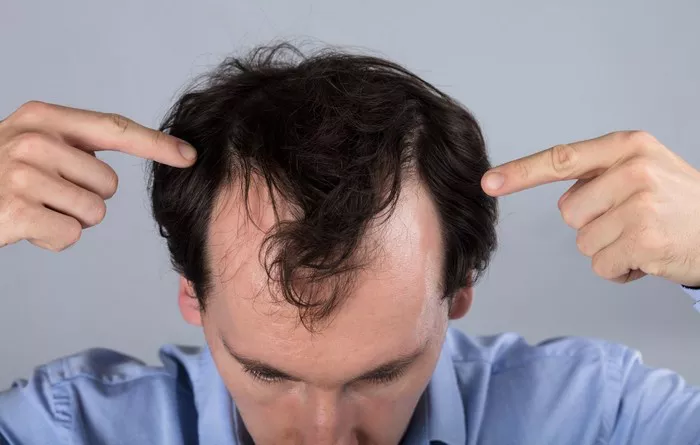In the fast-paced world we live in, stress has become an inevitable companion for many. Beyond its impact on mental well-being, stress can manifest physically, and one common consequence is stress-induced hair loss. Let’s delve into this intricate relationship and explore ways to mitigate its effects on your precious locks.
1. The Science Behind Stress Hair Loss: Unraveling the Mechanisms
Stress-induced hair loss, also known as telogen effluvium, occurs when there’s a disturbance in the natural hair growth cycle. Normally, hair follicles go through a cycle of growth, transition, and resting phases. However, under severe stress, a larger percentage of hair follicles can prematurely enter the resting phase, resulting in increased hair shedding.
1.1 Cortisol and Its Impact on Hair Follicles
The stress hormone cortisol plays a pivotal role in this process. Elevated cortisol levels, a hallmark of chronic stress, can disrupt the delicate balance of hormones that regulate hair growth. This disruption can lead to an increased number of hairs entering the resting phase and subsequently shedding.
1.2 Telogen Effluvium: The Culprit Unveiled
Telogen effluvium, the scientific term for stress-induced hair loss, is characterized by a widespread shedding of hair across the scalp. Understanding this condition is crucial to addressing its effects on your hair. Typically, hair loss becomes noticeable a few months after the onset of a stressful event, making it essential to connect the dots between life stressors and changes in your locks.
2. Identifying Stressors: Pinpointing the Catalysts for Hair Loss
To effectively manage stress-induced hair loss, it’s imperative to identify and address the specific stressors triggering this response. Stress can manifest in various forms, and recognizing these triggers can be the first step toward healthier locks.
2.1 Work-Related Stressors
High-pressure work environments, tight deadlines, and demanding job roles can significantly contribute to stress-induced hair loss. Implementing stress-management techniques in the workplace, such as mindfulness exercises or designated relaxation spaces, can mitigate the impact on your hair.
2.2 Emotional Stress and Its Toll
Relationship issues, grief, or any form of emotional turmoil can take a toll on both mental well-being and hair health. Seeking professional support through counseling or therapy can be instrumental in managing emotional stress and, consequently, preserving your locks.
2.3 Lifestyle Factors: The Silent Contributors
Unhealthy lifestyle choices, such as poor nutrition, lack of exercise, and inadequate sleep, can exacerbate stress-induced hair loss. Ensuring a balanced diet, regular physical activity, and sufficient sleep are essential components of a holistic approach to managing stress and promoting hair health.
3. Strategies for Stress Management: Nurturing Your Locks from Within
Mitigating stress-induced hair loss involves not only addressing external stressors but also adopting strategies to manage stress at its core. Incorporating these practices into your daily routine can contribute to healthier hair growth.
3.1 Mindfulness Meditation: A Stress-Busting Technique
Mindfulness meditation has been shown to reduce cortisol levels and promote a sense of calm. Integrating short meditation sessions into your routine can be a powerful tool in combating the physiological effects of stress on your hair.
3.2 Adequate Exercise: Balancing Body and Mind
Regular physical activity not only improves overall well-being but also helps regulate hormones, including cortisol. Engaging in activities you enjoy, whether it’s jogging, yoga, or dancing, can be an effective stress management strategy with positive implications for your hair health.
3.3 Nutrient-Rich Diet: Fueling Your Follicles
A well-balanced diet rich in essential nutrients is crucial for maintaining healthy hair. Include foods high in vitamins, minerals, and protein, as they play a vital role in supporting the growth and strength of your locks.
4. Seeking Professional Guidance: When to Consult a Specialist
While implementing lifestyle changes can have a positive impact, consulting a healthcare professional or a dermatologist specializing in hair health is essential if stress-induced hair loss persists. They can provide personalized insights, conduct necessary tests, and recommend targeted treatments to address your specific needs.
5. Tracking Progress: Patience as a Virtue in Hair Restoration
Reversing stress-induced hair loss takes time, and it’s crucial to be patient and consistent in implementing stress management strategies. Regularly monitoring the condition of your hair and recognizing improvements, even small ones, can be motivating and reinforce the effectiveness of your efforts.
6. Beyond External Solutions: Nurturing Inner Resilience for Lasting Results
In the quest for healthier hair, it’s vital to recognize the interconnectedness of mental and physical well-being. Cultivating inner resilience through practices like gratitude, positive affirmations, and fostering a supportive social network can contribute to long-term stress management and, consequently, healthier, more resilient locks.
See Also: How to Stop Tension Alopecia: Effective Strategies & Tips
In conclusion
Understanding the intricate relationship between stress and hair loss is the first step toward reclaiming control over your locks. By identifying stressors, implementing effective stress management strategies, and seeking professional guidance when needed, you can nurture not only your hair but also your overall well-being. Remember, a holistic approach is key to achieving lasting results in the battle against stress-induced hair loss.


